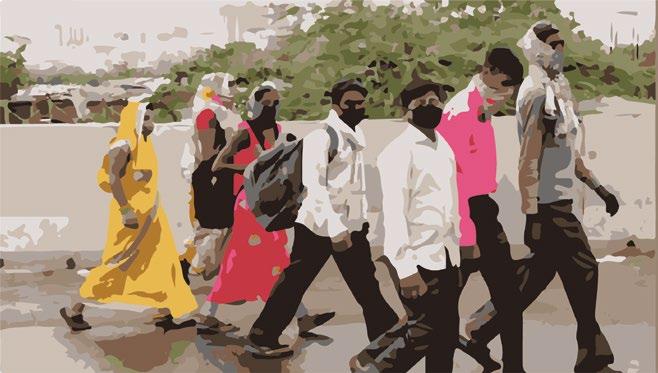
6 minute read
CONTENT
“Now so far as I am concerned that particular Section (124A IPC) is highly objectionable and obnoxious and it should have no place both for practical and historical reasons, if you like, in any body of laws that we might pass. The sooner we get rid of it the better… We might deal with that matter in other ways, in more limited ways, as every other country does but that particular thing, as it is, should have no place, because all of us have had enough experience of it in variety of ways and apart from the logic of the situation, our urges are against it.”
- Jawaharlal Nehru, the first Prime Minister of India
A case against the infamous Sedition Law
Sedition is an offence under the Indian Penal Code (IPC) and is defined under section 124A as follows: Whoever, by words, either spoken or written, or by signs, or by visible representation, or otherwise, brings or attempts to bring into hatred or contempt, or excites or attempts to excite disaffection towards, the Government established by law in India, shall be punished with imprisonment for life, to which fine may be added, or with imprisonment which may extend to three years, to which fine may be added, or with fine. The origin of the law of sedition is buried in India’s colonial past dating back to the 19th century, it was enacted in 1870 by the British.1 Abolished in England decades ago,2 it has been misused, more so, after Independence, as a tool by the police to quash democratic dissent. The
ignominious use of the law against writer, Arundhati Roy (2010), doctor activist, Binayak Sen (2007), cartoonist Aseem Trivedi (2012) and right-wing politician Praveen Togadia (2003) and Simranjit Singh Mann (2005) are cases in point. The Tamil Nadu police slapped sedition cases against thousands during the protests against the Kudankulam Nuclear Power Project in 2012-13. Decades earlier, in 1980-81 when, in the name of curbing Naxalites, Tamil Nadu cracked down on civil liberties activists and agricultural labor, hundreds of people were charged with sedition. Despite stating in its 2019 poll manifesto that it would repeal this section of the law, the Indian National Congress, now in the Opposition, did not do so during ten years that it was in power (2004-2014). Sedition is clearly an impediment to the right to dissent in a democracy which emanates from the Right to freedom of expression and speech under Article 19(1)(g) of the Indian Constitution.
Current Scenario
According to data released by the National Crime Bureau (NCRB) in its last report of 2018, the number of sedition cases registered in the country in 2016 there were 35, but 2018 saw 70 such cases. The data further indicates that while Jammu and Kashmir saw only one case in 2017, it jumped to 12 sedition cases in 2018! The number of sedition cases filed since 2015 stood at 191, of which trials were completed in 43 cases. However, the prosecution managed conviction only in four cases. None of the four cases in which trials were completed in 2015 ended in convictions.3 This section of the law is being so rampantly invoked, that any case that involves a person doing or saying anything that appears to be against the government, or even a comment on the government, invites sedition. Whether or not the police are able to prove the charge when the matter goes to trial in court is debatable, but sedition is clearly being used an arm-twisting tactic to intimidate dissenters. One example of how randomly the sedition charge is being invoked is an incident whereby a local leader of Anjuman-e-Islamia in Jammu and Kashmir was charged for sedition, on July 26, 2020 for delivering a speech in which he called for people to continue offering prayers at mosques, dismissing any threat from the coronavirus. There is no news of him having been granted bail. While this may be considered as offence of disobeying an order of a public servant or mischief, this statement in no way falls under the definition of ‘sedition.’4
Yet another example of misuse of sedition law was the case where the mother of school student in Bidar, Karnataka, was charged with sedition when the child participated in a play on January 21, 2020, that allegedly criticized Prime Minister Narendra Modi. The district court granted bail to the mother.5 The state is ruled by the BJP. 19-year-old Amulya Leona was arrested by the Bengaluru police for saying “Pakistan Zindabad” in a speech.6 Mere sloganeering does not amount to sedition, the Supreme Court of India has held in 1995. Sedition has also been invoked widely against journalists. On May 11, 2020, Dhaval Patel, a journalist from Ahmedabad, Gujarat, was charged with sedition and arrested for writing an article that said that the state’s Chief Minister may be replaced after displeasure of his handling of the COVID-19 crisis.7 While
this instance may seem unusual, there are several such instances of the misuse of the Sedition law.
Jurisprudence
Not too long ago, in 2016, the Supreme Court bench comprising Justices Dipak Misra and Uday Lalit asked authorities to be guided by the principles laid down by the Constitution Bench in Kedar Nath Singh vs. State of Bihar8 while dealing with offences under section 124A of IPC. The petition was filed against the misuse of the sedition law and the instances cited were of sedition charge against Amnesty International India for organising a debate on Kashmir and against Kannada actor-turned-politician, Ramya for her ‘Pakistan is not hell remark.9 The Courts, have over the years, considered the scope of sedition in several cases. In Arun Jaitley vs. State of UP, the High Court of Allahabad (November 5, 2015)10 the court held that the article merely voiced the opinion of the author and was not a call to arms.
The way forward
The rampant use of the sedition charge in any case that involves any comment against the government and suggests sections of the penal code are invoked while filing of a criminal complaint (FIR) arbitrarily when officials abuse their power. Severe restrictions in invoking this charge must be enforced and put in place by the legislature and judiciary. Making the charge non-cognisable in nature so that police may not arrest without warrant, judicial scrutiny before its application are the first few immediate steps needed before Sedition is completely removed from Indian criminal law.
1) https://www.outlookindia.com/website/story/opinion-section-124a-the-case-againstthe- much-misused-seditionlaw/347936 2) In 2009, India’s colonizers who introduced sedition here, abolished it in their own country. After a long campaign by free speech organizations, the UK got rid of offences of seditious libel and criminal defamation. 3) https://www.deccanherald.com/national/only-4-sedition-cases-saw-conviction-in-4- years-ncrb-793187.html 4) https://indianexpress.com/article/india/anjuman-e-islamia-leader-booked-on-seditioncharges- 6523640/ 5) https://timesofindia.indiatimes.com/city/bengaluru/karnatakas-shaheen-school-sedition-case-bail-granted-to-studentsmother-and-teacher/articleshow/74137184.cms#:~:text=BIDAR%3A%20A%20Bidar%20court%20in 6) https://www.outlookindia.com/website/story/india-news-girl-who-chanted-pakistanzindabad- at-caa protest-denied-bailslapped-with-sedition/347632 7) https://cpj.org/2020/05/indian-journalist-dhaval-patel-arrested-charged-wi/ 8) In Kedar Nath Singh vs. State of Bihar, which is a judgment from 1962, the Supreme Court had held that, “a citizen has a right to say or write whatever he likes about the Government, or its measures, by way of criticism or comment, so long as he does not incite people to violence against the Government”. 9) https://thewire.in/law/criticism-of-government-does-not-constitute-sedition-sayssupreme-court 10) The Magistrate, while adjudicating on an article authored by the “accused” titled ‘’NJAC Judgement-An Alternative View’ held that it “undoubtedly spread hatred and contempt against a duly elected Government and accordingly, in his opinion, the applicant prima facie appears to have committed offences under Section 124A and 505 I.P.C.”










